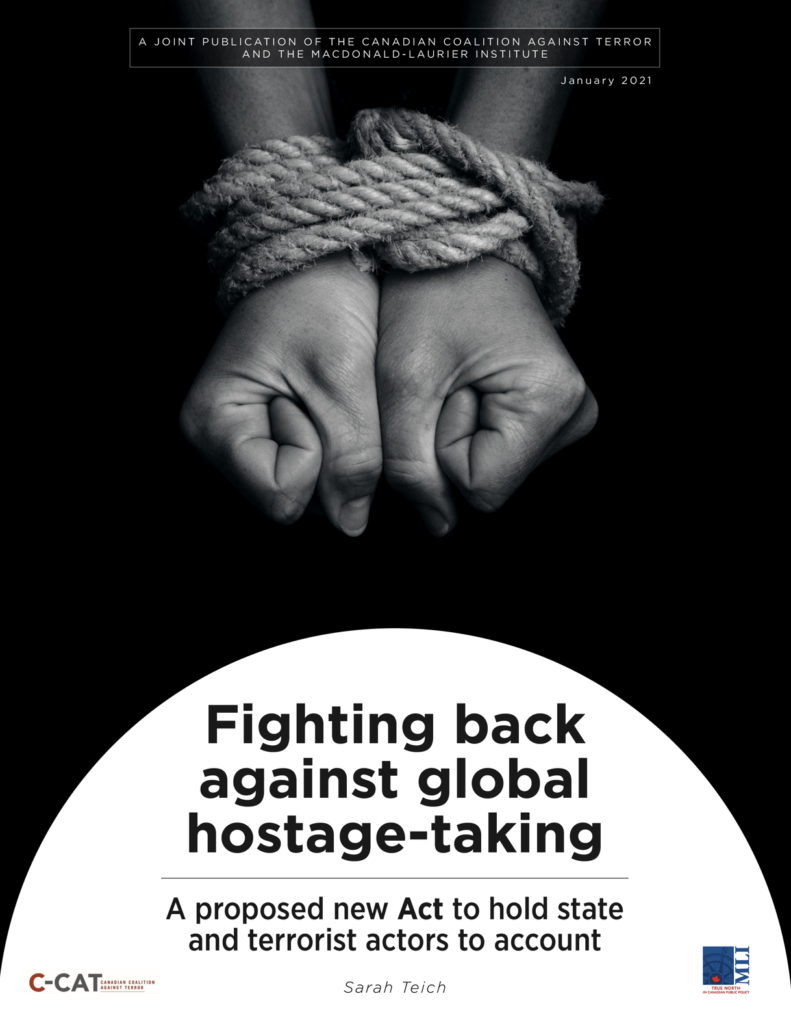The Canadian government needs new tools to discourage hostage-taking. Canadians are being seized at alarming rates by foreign states and terrorist organizations
by Sarah Teich, Shuvaloy Majumdar and Daniel Eisen
January 27, 2021
No one appreciates the depravity of targeted hostage-taking quite like Canadians. As Michael Kovrig and Michael Spavor continue to languish under deplorable conditions as hostages of the Chinese Communist Party, we are reminded constantly of the gravity of this heinous act.
For its part, the international community collectively decided to prohibit and punish hostage-taking with the adoption of the International Convention against the Taking of Hostages (the UN Hostages Convention) in 1979. It is now universally recognized that hostage-taking is an offence of grave concern to the international community.
However, the taking of Canadians as hostages has persisted, with Canadians being seized at alarming rates by foreign states and terrorist organizations. We all know about the kidnapping of Kovrig and Spavor, but their abductions follow a broader trend.
In 2015, Abu Sayyaf, a terrorist organization in the Philippines, kidnapped Canadians John Ridsdel and Robert Hall. They were both beheaded the following year.
In 2008, Ottawa faced five hostage situations in as many months: Melissa Fung in Afghanistan, Robert Fowler and Louis Guay in Niger, Beverley Giesbrecht in Pakistan and Amanda Lindhout in Somalia.
Despite the prevalence of these hostage situations, and despite ratifying the UN Hostages Convention in 1985, Canada has done shockingly little to address hostage-taking and hostage diplomacy. Canada complied with Article 2 of the UN Hostages Convention by criminalizing hostage-taking at home and abroad — and that’s it.
We don’t have any legislation that specifically addresses hostage-taking, and current Canadian policy with respect to hostage situations is distressingly unsupportive of the families of hostages, as revealed by a shocking eight-part Toronto Star investigation into the subject in 2016. Following the Star’s expose, the only adjustments the government made was to start providing “comfort letters” to families, reassuring them that they will not be prosecuted criminally if they hire a negotiator and designating two RCMP liaison officers to deal with the families.
Meanwhile, hostage-taking persists. The detention of Canadians by foreign states in particular — a subset of hostage-taking that is popularly called “hostage diplomacy” — is becoming the new normal. Canadian hostages continue to be seized without justification or due process, and they continue to be abused, tortured and murdered by their captors. Meanwhile, the Government of Canada remains ill-equipped to address these situations.
There’s a general consensus in the international community that states need to do more, at the domestic and multilateral levels, to combat hostage-taking and to secure the release of hostages without succumbing to ransom payments or political concessions. The United Nations Commission on Human Rights has specifically called upon all states to take measures to prevent, combat and punish acts of hostage-taking.
It is time for the Government of Canada to take such action. Canada needs legislation that specifically targets the problem of hostage-taking. There is a demonstrated legislative and policy gap, and we urge the government to address it.
A partnership of non-partisan Canadian organizations have stepped up to assist in this effort. As a first step, the Canadian Coalition Against Terror and the Macdonald-Laurier Institute have jointly released a paper that proposes specific legislation to combat and deter hostage-taking. We have even gone so far as to put together a first draft of what the legislation could look like.
Our proposed legislation is split into three parts. The first part would empower the government to impose sanctions on foreign countries and foreign nationals that take Canadians hostage. Canada already uses sanctions to deter human rights violations, but the existing legislation does not specifically cover those who take Canadians as hostages.
The second part would provide a framework to ensure that the families of hostages receive consistent and reliable support from our government, by imposing obligations on the federal government to communicate with the families, direct them to appropriate resources, offer them support and assist them in acquiring relevant information from any foreign national or state that is unwilling to share the information with them directly.
The third part of our proposed legislation would provide a framework for multilateral and bilateral collaboration, in recognition of the fact that like-minded countries must work together if we want the best possible chance of getting our hostages back home safely. It would empower the minister of foreign affairs to offer monetary rewards or asylum to foreign nationals who provide information leading to the release and repatriation of Canadian hostages, thereby incentivizing local support.
For too long, policymakers have sat idle while the safety of Canadians all over the world remains at risk. By introducing this workable and substantive legislation, we can discourage hostage-taking and better protect Canadians abroad.
Sarah Teich is an international human rights lawyer, a senior fellow at the Macdonald-Laurier Institute and a legal advisor to the Canadian Coalition Against Terror. Shuvaloy Majumdar is a program director and Munk senior fellow for foreign policy at the Macdonald-Laurier Institute. Daniel Eisen is co-founder of the Canadian Coalition Against Terror.
“Government needs new tools to discourage hostage-taking” first appeared in the National Post.
The Canadian government needs new tools to discourage hostage-taking. Canadians are being seized at alarming rates by foreign states and terrorist organizations
